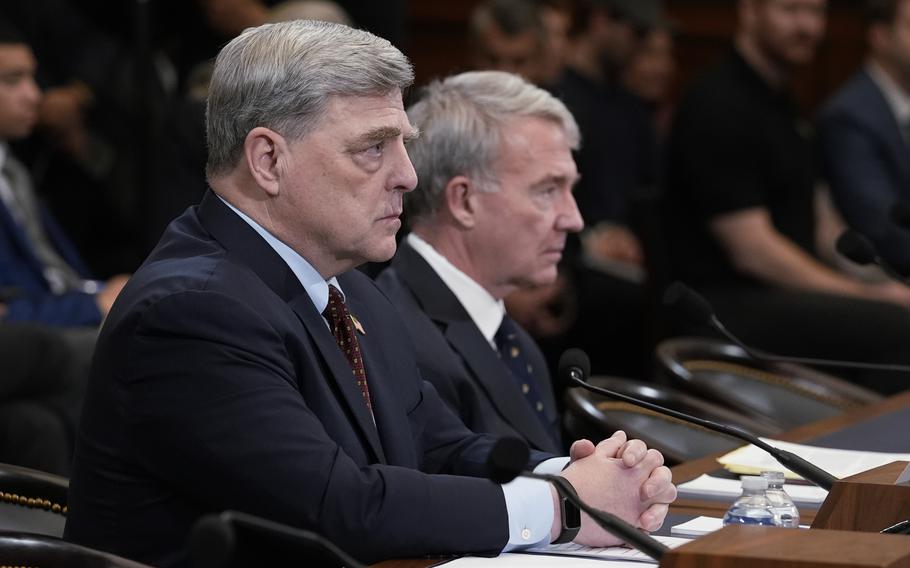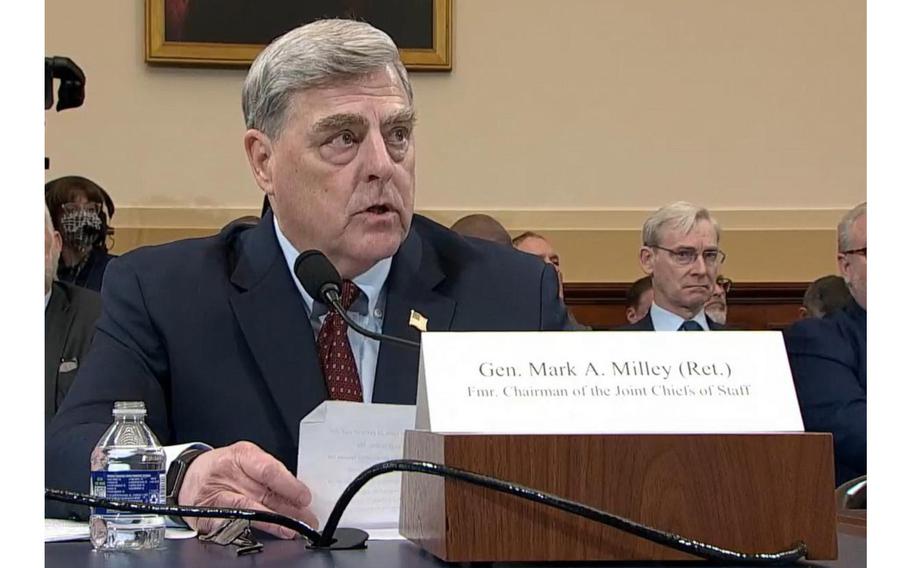
Retired Gen. Mark Milley, left, and retired Gen. Kenneth McKenzie speak to the House Foreign Affairs Committee at the Capitol in Washington on March 19, 2024. (J. Scott Applewhite/AP)
WASHINGTON — The top two generals who oversaw the U.S. withdrawal from Afghanistan in 2021 said Tuesday that the chaotic evacuation, which resulted in the deaths of 13 service members, was ordered too late.
Retired Gens. Mark A. Milley and Kenneth “Frank” McKenzie blamed delayed decision-making by the State Department for the rushed and violent airlift out of Kabul’s airport as the Taliban took over the country.
“The fundamental mistake, fundamental flaw was the timing of the State Department’s call of the [noncombatant evacuation operation], I think that was too slow and too late,” said Milley, the former chairman of the Joint Chiefs of Staff. “There’s a lot of other mistakes that are made along the way … but I think that was key, I think that was fundamental.”
The former military leaders shared their assessments with the House Foreign Relations Committee as Republicans continued their scrutiny of the drawdown of U.S. forces at the end of a 20-year war in Afghanistan.
“I will not rest until I get to the bottom of this tragedy,” said Rep. Michael McCaul, R-Texas, the committee chairman. “The American people deserve answers, and I intend to deliver.”

Retired Gen. Mark Milley, the former chairman of the Joint Chiefs of Staff, speaks to the House Foreign Affairs Committee about the U.S. withdrawal from Afghanistan on Tuesday, March 19, 2024, at the Capitol in Washington. (Screen capture from CSPAN video)
Milley and McKenzie offered testimony that largely echoed previous appearances they made before Congress while still in uniform.
They reiterated that they had opposed the full removal of U.S. troops but said the outcome of the withdrawal, which was marked by scenes of desperate Afghans clinging to departing planes, was ultimately the culmination of many decisions over many years of war.
Both said they wanted to appear before the committee to help the families of the fallen better understand the circumstances of the deadly exit.
Nearly 2,500 American service members died in Afghanistan, including 13 who were killed on Aug. 26, 2021, when a suicide bomber affiliated with the Islamic State detonated a bomb at the airport’s Abbey Gate entrance. The families of several troops who died that day attended the hearing Tuesday.
“We owe them answers, and I am committed to assist in the effort to get them answers,” Milley said. “But we should also not be under any illusion. We’re not going to get all the answers here today. It’s a process, it’s going to take a considerable length of time.”
The military recently completed an additional review of the bombing, interviewing troops who were not questioned during the original Abbey Gate investigation. Marine Sgt. Tyler Vargas-Andrews told lawmakers in public testimony last year that he spotted the suicide bomber responsible for the attack hours before the blast.
McKenzie said he alone bore full military responsibility for what happened at Abbey Gate as the then-commander of U.S. Central Command, which oversees military operations across the Middle East. But he also spoke at length about the frustration he felt with the State Department’s policies and actions.
“As you are aware, the decision to begin a [noncombatant evacuation operation] rests with the Department of State, not the Department of Defense,” McKenzie said. “But we could do nothing, nothing to commence the operation — the evacuation — until a [noncombatant evacuation operation] was declared.”
Both generals said they disagreed with President Joe Biden’s plan to maintain a diplomatic presence in Afghanistan after pulling out the military and believed it set the stage for the breakdown of security.
“I did not believe that was a feasible action in that I didn’t think that the government of Afghanistan would be around to be the partner for our diplomats, once we removed our military capability,” McKenzie said. “It was a divergence of opinion, and that divergence of opinion lasted until August, when we actually began to withdraw our embassy.”
The military withdrawal was completed by July 12, 2021, according to McKenzie, while the State Department order to evacuate all American citizens, Afghan allies and others did not come until Aug. 14, 2021. The Afghan government’s senior leadership fled the country the next day.
Republicans on Tuesday seized on the delays to criticize the Biden administration’s handling of the evacuation, vowing to hold Biden accountable as they continue their investigation into what went wrong.
“I believe that accountability ensures mistakes of the past are not repeated. But from where I sit, the president and this administration refused to acknowledge their failures,” McCaul said. “I launched this investigation to make sure that the mistakes made in Afghanistan never, ever happen again.”
Democrats, meanwhile, dismissed the hearing as a political stunt that obscured the role of other administrations in the withdrawal process. They repeatedly pointed to former president Donald Trump’s 2020 deal with the Taliban to pull out U.S. troops with few conditions.
“You can’t just take a peek at one little segment of it and say this is the reason everything happened without looking at what preceded it,” said Rep. Gregory Meeks of New York, the top Democrat on the committee. “If you’re serious about trying to figure out how we’re going to make sure that the mistakes that may have [been] made and the things that we did right, you can only do that in a serious investigation if you take all of it and you look at all of it and you examine all of it.”